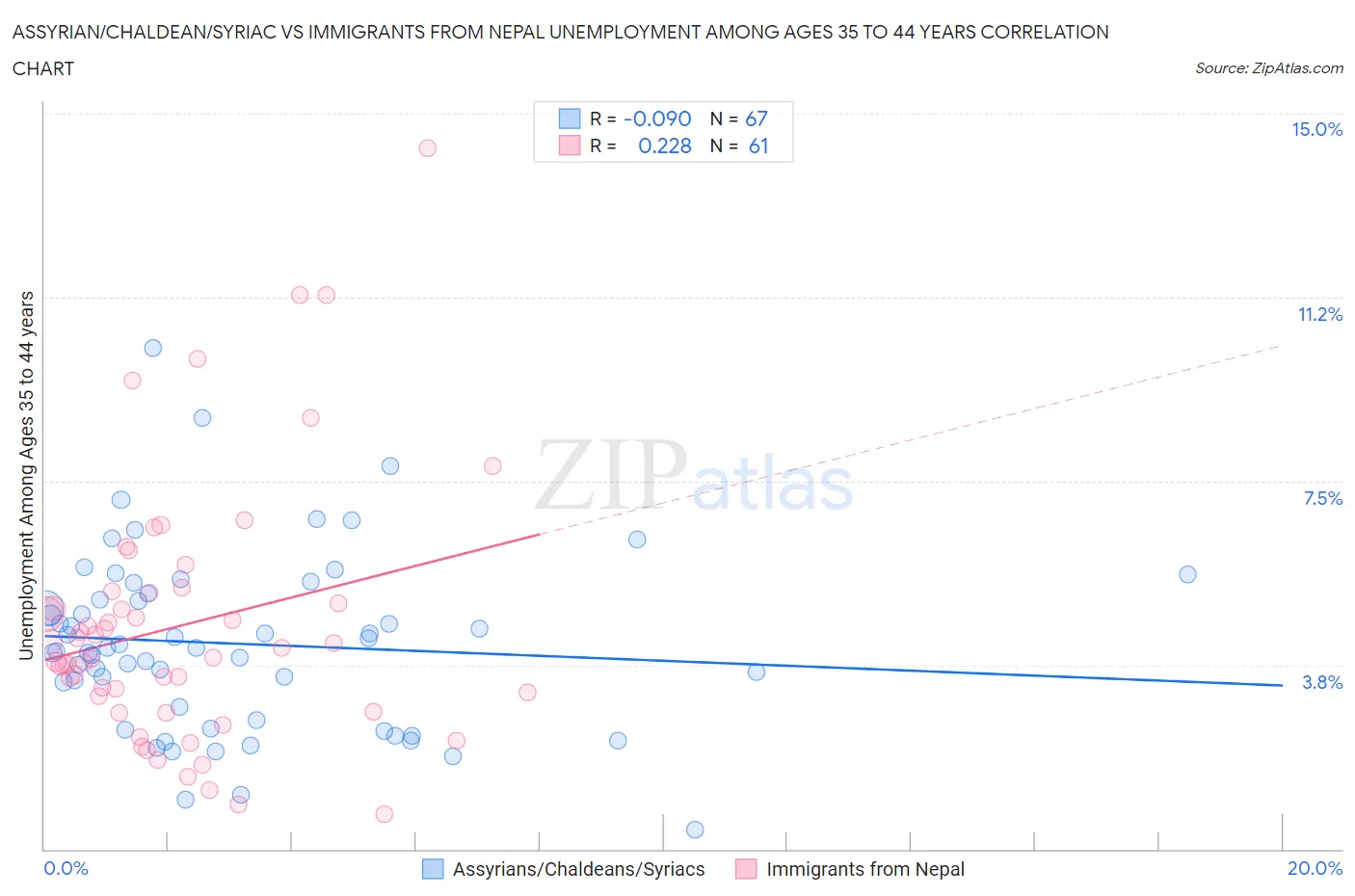Assyrian/Chaldean/Syriac vs Immigrants from Nepal Unemployment Among Ages 35 to 44 years
COMPARE
Assyrian/Chaldean/Syriac
Immigrants from Nepal
Unemployment Among Ages 35 to 44 years
Unemployment Among Ages 35 to 44 years Comparison
Assyrians/Chaldeans/Syriacs
Immigrants from Nepal
4.3%
UNEMPLOYMENT AMONG AGES 35 TO 44 YEARS
99.3/ 100
METRIC RATING
27th/ 347
METRIC RANK
4.2%
UNEMPLOYMENT AMONG AGES 35 TO 44 YEARS
99.7/ 100
METRIC RATING
19th/ 347
METRIC RANK
Assyrian/Chaldean/Syriac vs Immigrants from Nepal Unemployment Among Ages 35 to 44 years Correlation Chart
The statistical analysis conducted on geographies consisting of 109,865,928 people shows a slight negative correlation between the proportion of Assyrians/Chaldeans/Syriacs and unemployment rate among population between the ages 35 and 44 in the United States with a correlation coefficient (R) of -0.090 and weighted average of 4.3%. Similarly, the statistical analysis conducted on geographies consisting of 185,230,229 people shows a weak positive correlation between the proportion of Immigrants from Nepal and unemployment rate among population between the ages 35 and 44 in the United States with a correlation coefficient (R) of 0.228 and weighted average of 4.2%, a difference of 2.0%.

Unemployment Among Ages 35 to 44 years Correlation Summary
| Measurement | Assyrian/Chaldean/Syriac | Immigrants from Nepal |
| Minimum | 0.40% | 0.70% |
| Maximum | 10.2% | 14.3% |
| Range | 9.8% | 13.6% |
| Mean | 4.2% | 4.6% |
| Median | 4.1% | 4.1% |
| Interquartile 25% (IQ1) | 2.6% | 3.0% |
| Interquartile 75% (IQ3) | 5.2% | 5.2% |
| Interquartile Range (IQR) | 2.6% | 2.3% |
| Standard Deviation (Sample) | 1.8% | 2.6% |
| Standard Deviation (Population) | 1.8% | 2.6% |
Demographics Similar to Assyrians/Chaldeans/Syriacs and Immigrants from Nepal by Unemployment Among Ages 35 to 44 years
In terms of unemployment among ages 35 to 44 years, the demographic groups most similar to Assyrians/Chaldeans/Syriacs are Turkish (4.3%, a difference of 0.020%), Bulgarian (4.3%, a difference of 0.080%), Immigrants from Japan (4.3%, a difference of 0.080%), European (4.3%, a difference of 0.27%), and Immigrants from Pakistan (4.3%, a difference of 0.34%). Similarly, the demographic groups most similar to Immigrants from Nepal are Immigrants from Bolivia (4.2%, a difference of 0.25%), Latvian (4.2%, a difference of 0.27%), Swedish (4.2%, a difference of 0.28%), Cuban (4.2%, a difference of 0.29%), and Paraguayan (4.2%, a difference of 1.0%).
| Demographics | Rating | Rank | Unemployment Among Ages 35 to 44 years |
| Bolivians | 99.9 /100 | #13 | Exceptional 4.1% |
| Czechs | 99.9 /100 | #14 | Exceptional 4.1% |
| Tongans | 99.8 /100 | #15 | Exceptional 4.2% |
| Cubans | 99.8 /100 | #16 | Exceptional 4.2% |
| Swedes | 99.8 /100 | #17 | Exceptional 4.2% |
| Latvians | 99.8 /100 | #18 | Exceptional 4.2% |
| Immigrants | Nepal | 99.7 /100 | #19 | Exceptional 4.2% |
| Immigrants | Bolivia | 99.7 /100 | #20 | Exceptional 4.2% |
| Paraguayans | 99.6 /100 | #21 | Exceptional 4.2% |
| Scandinavians | 99.5 /100 | #22 | Exceptional 4.2% |
| Immigrants | Kuwait | 99.5 /100 | #23 | Exceptional 4.3% |
| Tlingit-Haida | 99.5 /100 | #24 | Exceptional 4.3% |
| Bulgarians | 99.3 /100 | #25 | Exceptional 4.3% |
| Turks | 99.3 /100 | #26 | Exceptional 4.3% |
| Assyrians/Chaldeans/Syriacs | 99.3 /100 | #27 | Exceptional 4.3% |
| Immigrants | Japan | 99.3 /100 | #28 | Exceptional 4.3% |
| Europeans | 99.2 /100 | #29 | Exceptional 4.3% |
| Immigrants | Pakistan | 99.2 /100 | #30 | Exceptional 4.3% |
| Carpatho Rusyns | 99.2 /100 | #31 | Exceptional 4.3% |
| Chinese | 99.1 /100 | #32 | Exceptional 4.3% |
| Immigrants | Sri Lanka | 99.1 /100 | #33 | Exceptional 4.3% |